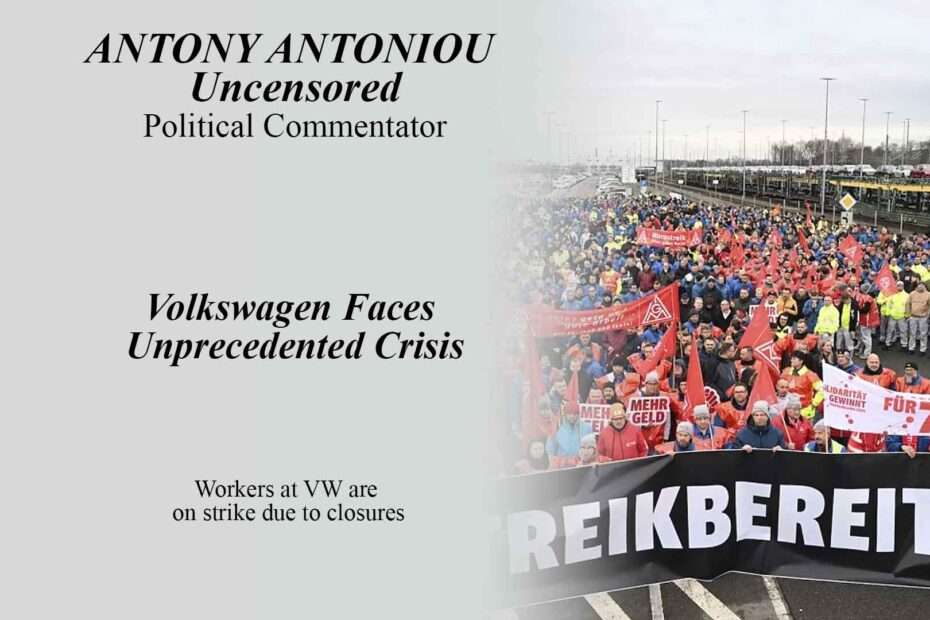Volkswagen Faces Unprecedented Crisis
Electric Vehicle Transition Sparks Labour Unrest
Volkswagen, Germany’s automotive giant, is confronting a critical moment in its storied history as workers across multiple factories stage strikes in response to the company’s restructuring plans and proposed wage cuts.
Factory Strikes Emerge Amid Electric Vehicle Challenges
For the first time in its 87-year history, Volkswagen is threatening to close factories in Germany, reflecting the profound challenges facing European automotive manufacturers in the electric vehicle (EV) market.
Workers at key plants including Wolfsburg, which employs 70,000 people, and Hanover, with 14,000 staff, have initiated strikes. The industrial action follows the company’s controversial proposals, including a potential 10% wage reduction and factory closures.
Scale of the Industrial Action
At Wolfsburg, the company’s primary manufacturing facility, a two-hour strike prevents the production of several hundred vehicles. The strikes are not limited to one location, with plants in Zwickau – Volkswagen’s dedicated EV manufacturing site – also experiencing significant disruption.
Market Challenges and Sales Decline
The strikes coincide with a dramatic slump in electric vehicle sales across Europe. In the first quarter of the year, EV sales dropped by 24%, with Volkswagen’s global sales declining by 3%. Consumers are increasingly returning to petrol-powered vehicles, challenging the industry’s electrification strategy.
Global and Domestic Context
The crisis arrives during a period of significant economic uncertainty in Germany. Volkswagen’s struggles reflect broader challenges in the automotive sector, with manufacturers battling foreign competition, escalating production costs, and tepid consumer enthusiasm for electric vehicles.
Union Response and Negotiations
Thorsten Groeger, representing the IG Metall union, delivered a pointed message to management: “Anyone who ignores the workforce is playing with fire – and we know how to turn sparks into flames.”
Daniela Cavallo, head of Volkswagen’s works council, suggested that major shareholders – including the Porsche and Piech families – might also need to make financial sacrifices. She emphasised that plant closures, mass layoffs, and wage cuts are unacceptable “red lines” for workers.
Proposed Cost-Saving Measures
The union previously proposed saving €1.5 billion by foregoing bonuses for 2025 and 2026, a suggestion management summarily dismissed as unrealistic.
Broader Automotive Landscape
Volkswagen is not alone in its struggles. Stellantis, which owns Vauxhall, recently announced plans to close its Luton van factory, putting 1,100 jobs at risk. The company’s chief executive resigned after a substantial 40% value decline.
Political and Regulatory Environment
The UK’s approach to electric vehicle transition has also been fluctuating. Prime Minister Rishi Sunak previously pushed back the deadline for blocking new petrol and diesel car sales from 2030 to 2035. The Labour Party, while initially committed to the 2030 target, now appears willing to compromise, potentially allowing hybrid vehicle sales until 2035.
Industry Perspective
Manufacturers have been lobbying against the zero-emission vehicle (ZEV) mandate, arguing that consumer demand remains insufficient to support a rapid transition.
Worker Sentiment
Union representatives have been vocally critical of management’s strategy. Sascha Dudzik condemned executives for “making workers pay” for strategic mistakes, including the diesel emissions scandal and falling behind innovative competitors.
Lucia Heim, a Volkswagen worker, poignantly summarised the workers’ frustration: “It’s a twisted world: in football, trainers quit if they’re not winning the game. At VW, it’s the other way around. Players are being punished.”
Looking Ahead
The fourth round of negotiations, scheduled for 9 December, will be crucial. Union leaders have made it clear that without substantial compromises from management, the strikes could escalate to 24-hour or unlimited stoppages.
A Volkswagen spokesperson stated that the company respects workers’ right to strike and is working to minimise disruption to customer supplies.
As the automotive industry navigates this complex transition, Volkswagen’s current crisis represents a microcosm of the broader challenges facing traditional manufacturers in the electric vehicle era.
Summary
In short, the consequences of the determined push towards EVs, even though they are not really wanted are now beginning to be manifested in the destruction of European car manufacturing and the subsequent loss of jobs.
1. Slow Consumer Adoption
– EV sales in Europe dropped 24% in the first quarter
– Consumers are returning to petrol-powered vehicles
– Low consumer appetite is challenging manufacturers’ electrification strategies
2. Manufacturing Challenges
– High production costs for EVs
– Increased competition from global manufacturers
– Difficulty transitioning existing production lines
3. Economic Pressure on Manufacturers
– Volkswagen’s global sales dropped 3%
– Potential factory closures (first time in VW’s history)
– Wage cuts and workforce reductions being considered
4. Regulatory Uncertainty
– Shifting government deadlines for EV mandates
– Manufacturers lobbying against aggressive zero-emission vehicle targets
– Potential compromises on transition timelines (e.g., allowing hybrid sales until 2035)
5. Strategic Realignment
– Manufacturers reassessing EV investment strategies
– Exploring more gradual transition approaches
– Potential scaling back of ambitious electric vehicle plans
The overall implication is a complex, challenging transition with significant economic and industrial disruption for European car manufacturers.

